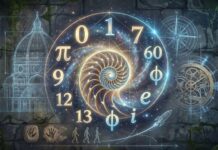
In this article, we’re diving headfirst into these mind-bending concepts and unveiling our ultimate top 10 must-read books about simulation hypothesis and matrix that’ll blow your mind wide open. We’re talking visionary authors, mind-expanding philosophical debates, and thrilling narratives that’ll have you questioning everything you thought you knew about reality.
Whether you’re a deep-thinking philosopher searching for profound revelations or a sci-fi fanatic craving mind-blowing adventures, our list has got you covered. These books will take you on a wild ride through simulated realities, challenge your notions of existence, and leave you questioning the very fabric of the universe.
So, get ready to lose yourself in the pages of these mind-bending works as we explore the top 10 books that’ll turn your reality upside down. Buckle up, open your mind, and let’s jump into a world where what you think you know might just be an illusion. Get ready for a wild ride through the rabbit hole of simulation theory and the Matrix! Let’s go!
Related:
Hope you’ll enjoy those books:
- “Simulacra and Simulation” by Jean Baudrillard:
Baudrillard’s seminal work is an exploration of the hyperreal nature of modern society and the blurring boundaries between simulation and reality. He argues that our world is saturated with simulations that often surpass the authentic, resulting in a society disconnected from genuine experiences. Baudrillard analyzes the influence of media, consumer culture, and technology in creating hyperreal environments, challenging readers to question the very nature of reality and the implications of living in a world where simulations dominate our perceptions. - “The Matrix and Philosophy: Welcome to the Desert of the Real” edited by William Irwin:
This captivating anthology dives into the philosophical underpinnings of the Matrix film trilogy, exploring the concepts of perception, reality, and the nature of freedom. The essays delve into the philosophical influences behind the movies, including Descartes’ evil demon, Plato’s Allegory of the Cave, and Baudrillard’s simulacra. By dissecting the films’ themes of illusion, choice, and the nature of the self, the book offers readers a deeper understanding of the philosophical ideas embedded within the Matrix universe. - “The Simulation Hypothesis: An MIT Computer Scientist Shows Why AI, Quantum Physics, and Eastern Mystics All Agree We Are in a Video Game” by Rizwan Virk:
Virk’s comprehensive exploration of the simulation hypothesis draws from a wide range of disciplines to present a compelling case for our existence within a simulated reality. He explores the convergence of AI advancements, quantum physics theories, and ancient mystical teachings, demonstrating their shared support for the idea that our world is akin to a video game. Virk delves into topics such as the nature of consciousness, the simulation argument, and the potential existence of higher-dimensional beings, offering readers a thought-provoking journey into the depths of simulated existence. - “Permutation City” by Greg Egan:
Egan’s mind-bending novel takes readers to a future where scientists discover the ability to upload human consciousness into digital substrates. The story follows characters who seek to escape the limitations of physical existence by creating digital replicas of themselves within intricate virtual worlds. Egan masterfully explores the philosophical implications of this technology, raising questions about the nature of identity, the potential for immortality, and the fundamental essence of being. Through complex narratives and intricate world-building, Egan challenges readers to contemplate the boundaries of existence and the ethical dilemmas that arise when consciousness transcends the physical realm. - “I Am a Strange Loop” by Douglas Hofstadter:
Hofstadter’s captivating exploration of selfhood delves into the enigmatic nature of consciousness and identity. Drawing on analogies from mathematics, cognition, and philosophy, Hofstadter posits that our sense of self emerges from complex patterns of self-reference. He delves into the recursive nature of the mind and its ability to create abstract symbols and meanings, ultimately presenting a theory of the “strange loop” where selfhood arises from a web of interconnected processes. Through rich examples and thought experiments, Hofstadter invites readers to reflect on the nature of consciousness and the fundamental nature of “I.” - “Schild’s Ladder” by Greg Egan:
Egan’s thought-provoking science fiction novel transports readers to a future where scientists manipulate the laws of physics within a simulated universe. As they venture into uncharted territories, they discover a ladder-like structure known as “Schild’s Ladder” that allows them to alter the fundamental constants of the simulated reality. However, their actions have unforeseen consequences, triggering a cataclysmic chain of events that threaten both the virtual world and the foundation of their own existence. Egan masterfully explores the ethical and existential dilemmas that arise from tampering with reality, pushing readers to consider the profound implications of playing with the fabric of existence. - “Neuromancer” by William Gibson:
Gibson’s groundbreaking cyberpunk novel introduces readers to a dystopian future where cyberspace, a virtual reality network, and the allure of “jacking in” become dominant elements of society. The protagonist, a washed-up hacker named Case, embarks on a dangerous mission that blurs the lines between physical reality and the digital realm. Gibson’s vivid prose paints a gritty and immersive world, rich with technological advancements, artificial intelligence, and corporate espionage. Through Case’s journey, readers are thrust into a world where the boundaries of reality are constantly shifting, inviting them to question the nature of identity, the impact of technology, and the potential consequences of a society heavily reliant on virtual experiences. - “Ready Player One” by Ernest Cline:
Cline’s exhilarating novel immerses readers in a dystopian future where the OASIS, a virtual reality simulation, becomes an escape from an economically devastated world. The story follows Wade Watts, a young “gunter” on a quest to solve a series of puzzles left by the OASIS’s creator, promising vast fortune and control of the virtual world. Through nostalgic references to ’80s pop culture, Cline creates a world where virtual reality intersects with reality, blurring the boundaries between the two. With thrilling action and a narrative that explores the power of imagination and the consequences of an all-encompassing virtual existence, Cline’s work offers readers an adventure that sparks contemplation about the impact of simulated worlds on our lives. - “The Fabric of Reality” by David Deutsch:
Deutsch’s expansive work spans multiple disciplines, offering a profound exploration of reality, computation, and the nature of knowledge. Drawing on concepts from quantum physics, epistemology, and cosmology, Deutsch presents a grand synthesis of scientific theories. He delves into the significance of computation, the potential for quantum computers, and the concept of multiple parallel universes. By blending hard science with philosophical musings, Deutsch challenges readers to expand their understanding of the universe and confront the fundamental nature of reality. Through his eloquent arguments and engaging prose, Deutsch invites readers to embark on an intellectual journey that probes the deepest mysteries of existence. - “Snow Crash” by Neal Stephenson:
Stephenson’s gripping cyberpunk thriller whisks readers away to a near-future where a virtual reality metaverse known as the “Metaverse” dominates society. The narrative follows Hiro Protagonist, a freelance hacker and pizza deliveryman, as he uncovers a conspiracy involving an ancient Sumerian language virus called Snow Crash. With its addictive digital drug and the potential to reprogram human minds, Snow Crash blurs the boundaries between the virtual and physical worlds. Stephenson’s masterful storytelling takes readers on a thrilling ride through a dystopian landscape, intertwining themes of linguistics, information control, and the power of language to shape our perception of reality. Through his vivid imagery and layered narrative, Stephenson offers readers a cautionary tale that probes the consequences of a world inundated with technology and simulation.
So there you have it. Hopefully some of these books will spark your imagination and guide you further into exploration of this interesting hypothesis about our world.




























